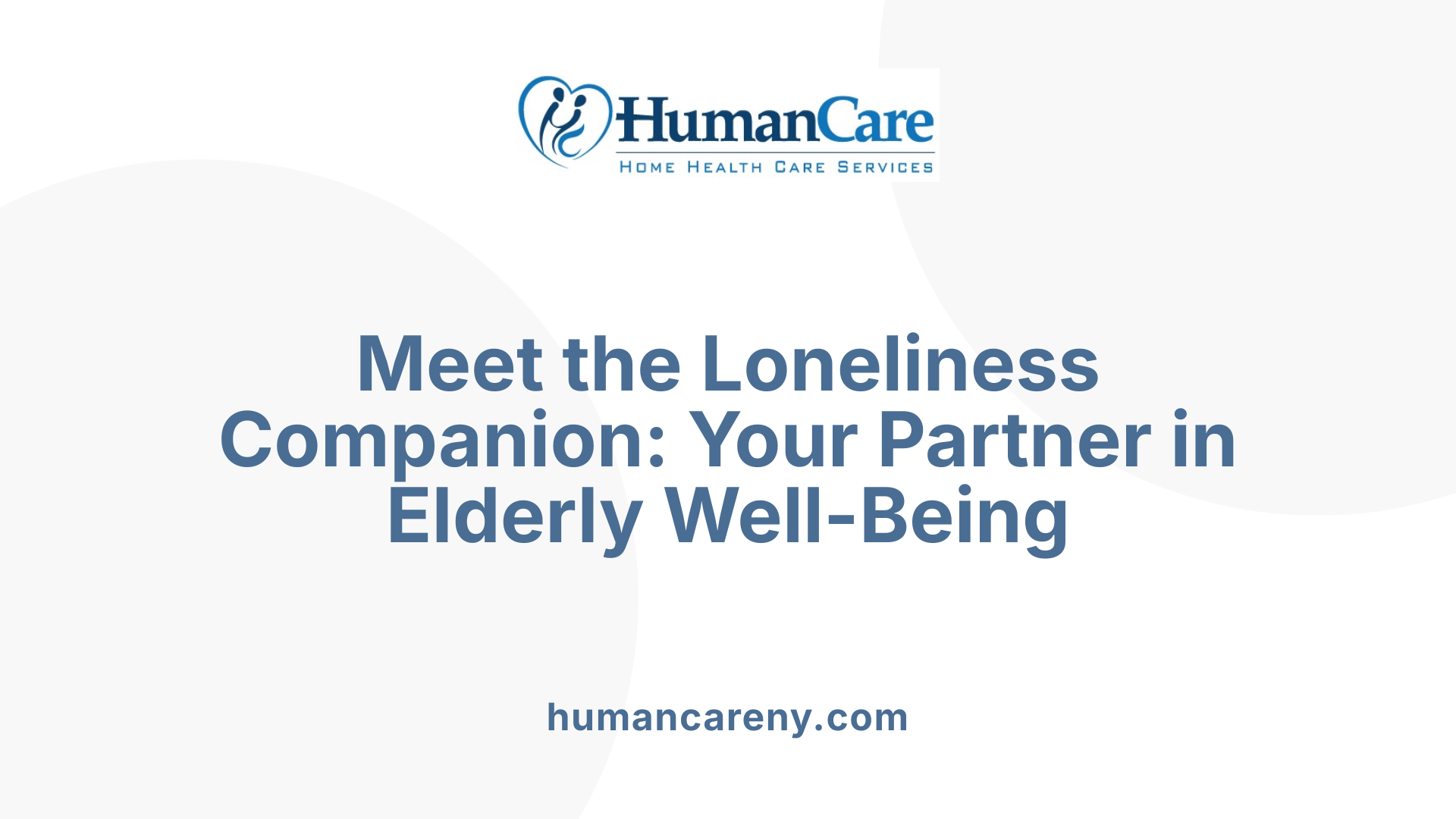Understanding the Impact of Loneliness on Seniors
Loneliness among the elderly is a pressing health issue that can severely impair both mental and physical health. Nearly 25% of seniors over 65 experience social isolation, which increases their risk of depression, dementia, heart disease, and stroke. Social connection and companionship are critical for promoting well-being, mental sharpness, and longevity. As aging often involves mobility challenges, loss of loved ones, or social circle shrinking, many seniors face escalating feelings of insignificance, neglect, and emotional distress. Recognizing these challenges, companion care emerges as a vital intervention, offering more than physical assistance — it provides the human connection that seniors need to thrive.
The Significance of Companionship for the Elderly

Why is companionship considered significant in alleviating feelings of loneliness among the elderly?
Companionship holds a crucial role in improving the lives of seniors by providing emotional warmth, social interaction, and a sense of belonging. As they age, many seniors face challenges like mobility restrictions, the loss of loved ones, or friends moving away, which increases their risk of social isolation.
Regular visits and engaging conversations with a caregiver help seniors feel valued and connected. These interactions foster mental stimulation through shared activities like hobbies, games, or walks. Feeling emotionally supported and understood, seniors often experience greater happiness and reduced worries.
Apart from emotional benefits, companionship also enhances safety at home. Caregivers assist with daily tasks such as grocery shopping, meal prep, and housekeeping, creating opportunities for social engagement and reducing hazards. They facilitate connections to the community by encouraging participation in social gatherings, clubs, or local events.
Introducing digital tools like video calls and social media with the help of caregivers boosts seniors’ ability to communicate with family or friends who may live far away, further decreasing feelings of loneliness.
Research from the UK Biobank indicates that social interactions significantly lower mortality risks—visits from family or friends can reduce death risk by nearly 39%. Such data emphasize the importance of social engagement.
Overall, companionship offers seniors emotional support, improved mental health, and physical well-being. It acts as a safeguard against depression, dementia, heart disease, and stroke, fostering a sense of purpose and joy in their daily lives. Building genuine relationships through companionship ensures that seniors feel cared for, connected, and cherished, which greatly enhances their quality of life.
How Companion Care Reduces Loneliness and Social Isolation
How does companion care help to reduce loneliness and social isolation among the elderly?
Companion care plays a vital role in alleviating loneliness and social isolation experienced by many seniors. Regular visits from dedicated caregivers provide consistent, personalized social interactions that help seniors feel connected and valued. These visits often include meaningful conversations, sharing meals, or engaging in activities that stimulate both the mind and body. By creating a routine of companionship, caregivers address feelings of insignificance, abandonment, or being ignored.
Beyond conversations, companion caregivers encourage seniors to participate in hobbies, light physical activities like walking, and mental exercises such as puzzles or games. These activities foster mental vitality and physical health, reducing the risk of cognitive decline and depression. Additionally, caregivers facilitate social outings and community involvement, helping seniors attend local events, clubs, or religious gatherings, which enhances their social connections.
The services are deeply personalized, tailored to each individual's needs, preferences, and abilities. Whether it’s helping with technology to stay connected via social media or arranging transportation to social engagements, companion care ensures seniors maintain independence while feeling supported.
Moreover, fostering connections with family and friends is integral. Caregivers can assist with making phone calls, setting up video chats, or accompanying seniors to social gatherings, reinforcing their sense of belonging. This comprehensive approach not only strengthens emotional well-being but also prevents the negative health impacts associated with prolonged social isolation, such as depression, heightened risk of dementia, and heart disease.
Overall, companion care combines emotional support, social engagement, and practical assistance, effectively reducing feelings of loneliness. It helps seniors lead more active, connected, and fulfilling lives, ultimately improving their mental and physical health well into old age.
The Role of a Loneliness Companion</hanging_:

What does a loneliness companion do?
A loneliness companion, also known as a companion caregiver, plays a vital role in enhancing the emotional and social well-being of seniors. Their primary responsibility is to offer companionship and emotional support, helping to alleviate feelings of loneliness, isolation, and neglect that many elderly individuals experience.
Companions spend regular time with seniors, engaging in meaningful activities such as conversations, playing games, sharing meals, or taking walks together. These interactions not only provide mental stimulation but also foster a sense of connection and belonging.
Beyond emotional support, companionship providers assist with practical daily tasks. They may help with errands like grocery shopping, preparing meals, light housekeeping, and attending medical appointments. This support ensures that seniors can maintain their independence and comfort at home.
The scope of a companion caregiver's role varies depending on individual needs. Some may visit for just a few hours weekly, engaging in social activities or providing company. Others become full-time, offering live-in care that includes supervision, safety assistance, and ongoing companionship.
Overall, the goal of a loneliness companion is to promote mental health, encourage social engagement, and support seniors in living fulfilling, autonomous lives within the comfort of their homes. Through consistent presence and personalized care, these caregivers help seniors maintain a positive outlook and improve their quality of life.
How Companion Care Operates in Practice

How does companion care work?
Companion care is designed to improve the lives of seniors by offering regular social interaction, emotional support, and help with daily routines. Caregivers engage in conversations, share meals, and participate in activities that promote mental stimulation and happiness.
A primary aspect of companion care involves assisting with everyday tasks such as light housekeeping, grocery shopping, meal prep, medication reminders, and transportation to appointments or social outings. These services not only ensure the senior’s safety and comfort but also create opportunities for social engagement, reducing loneliness.
Moreover, companion caregivers support seniors with specific health conditions like dementia or Alzheimer’s by implementing routines, facilitating cognitive activities, and managing confusion or disorientation. They tailor their approach to meet each individual's needs, preferences, and abilities.
Personalized care plans are a hallmark of effective companion services. Developed in collaboration with families and health professionals, these plans adapt over time to address evolving needs while focusing on fostering trust, independence, and emotional well-being.
Ultimately, companion care aims to build genuine relationships that go beyond physical assistance. It encourages seniors to participate in hobbies, community events, and social media, helping them stay connected and active. This holistic approach promotes a sense of security and purpose, significantly enhancing seniors’ quality of life.
Benefits of Companion Care on Social and Emotional Well-Being

What are the benefits of companion care in improving seniors' social well-being and emotional health?
Companion care plays a vital role in enhancing seniors' social and emotional well-being. Regular visits from caregivers provide consistent social interaction, which helps reduce feelings of loneliness and social isolation that many older adults face. These relationships foster a sense of connection and purpose, making seniors feel valued and supported.
Besides emotional comfort, companion care helps seniors manage stress, anxiety, and depression. Through friendly conversations, shared activities, and emotional support, caregivers create a safe space for seniors to express themselves and find comfort. Engaging in hobbies, talking about memories, or simply sharing a meal can significantly lift spirits and improve mental health.
Companions also promote cognitive health by encouraging participation in activities that stimulate the mind, such as playing games or discussing current events. This mental engagement helps delay cognitive decline and keeps seniors lively and alert.
Moreover, companions support physical well-being by helping seniors stay active with walks or exercises, and by facilitating attendance at social outings or community events. These efforts improve mobility, foster new social connections, and help seniors maintain their independence.
Altogether, companion care nurtures a sense of belonging and happiness, making it a powerful approach to help seniors age with dignity, joy, and emotional resilience.
Improving Quality of Life and Fostering Independence

How does companion care promote happiness and emotional well-being?
Companion care significantly boosts seniors' happiness by offering regular, meaningful social interactions. Dedicated caregivers engage in conversations, share meals, and participate in hobbies, which helps seniors feel connected and valued. This ongoing companionship alleviates loneliness and feelings of insignificance, common issues faced by older adults. Emotional support from trusted caregivers can also help reduce symptoms of depression and anxiety, contributing to a more positive outlook on life.
Supporting physical activity and mental engagement
Staying active is vital for seniors’ physical and mental health. Companion caregivers encourage participation in light exercises, walks, and recreational activities, making physical movement a regular part of daily life. Mental stimulation is equally important; caregivers facilitate activities like puzzles, reading, or playing games, which help maintain cognitive functions. These engagements not only keep seniors physically and mentally sharp but also bring joy through shared experiences and new memories.
Assistance with daily tasks to promote independence and safety
Helping with everyday activities supports seniors in living independently at home. Companion caregivers assist with meal prep, light housekeeping, medication reminders, and transportation to appointments or social outings. These tasks may seem simple but are crucial for maintaining a safe and comfortable environment. They also provide opportunities for social interaction, which can lift spirits and reinforce a sense of routine and purpose.
Personalized and flexible care services
Every senior has unique needs and preferences. Companion care providers tailor their services to match these individual requirements by creating customized care plans. Caregivers consider personal interests, health status, and social habits, ensuring support is relevant and respectful of each senior’s dignity. Flexibility in scheduling and caregiver assignments ensures that seniors receive appropriate attention when they need it most, fostering trust and security.
The overall impact on seniors' independence
Through emotional support, activity encouragement, and assistance with daily routines, companion care helps elderly individuals maintain their independence longer. It reduces reliance on family members and professional healthcare facilities by enabling seniors to thrive in their own homes. As a result, seniors enjoy a better quality of life characterized by emotional fulfillment, physical health, and a sense of autonomy.
| Aspect | Benefits | Additional Details |
|---|---|---|
| Emotional support | Reduces loneliness & depression | Regular companionship fosters attachments and mental health |
| Physical activity | Maintains mobility & strength | Encourages walks, exercises, and hobbies |
| Cognitive engagement | Preserves mental sharpness | Puzzles, conversation, social activities |
| Daily task assistance | Promotes independence and safety | Meal prep, housekeeping, transportation |
| Personalized care | Ensures tailored support | Based on interests, health, and routines |
| Flexibility | Ensures consistent support | Adjustable hours & caregiver matching |
Research shows that social interaction and personalized support provided by companion care not only improve mood but also reduce health risks such as dementia, heart disease, and stroke. This holistic approach to elder care contributes to longevity and a higher level of life satisfaction, reinforcing the importance of fostering independence and well-being through dedicated companionship.
Embracing Companion Care to Combat Senior Loneliness
Companion care is a powerful strategy in addressing the pervasive issue of loneliness among seniors. By providing human connection, emotional support, and practical assistance, it helps seniors maintain their independence, stay active, and feel valued. The personalized, compassionate approach of companion care enhances emotional well-being, reduces health risks associated with social isolation, and promotes a more fulfilling, joyful aging experience. Families and communities play a crucial role in supporting these services as they contribute to healthier, happier, and more connected lives for our elderly population.
References
- How Companion Care Can Help Combat Senior Isolation and ...
- Companion Care for Seniors: Overcoming Loneliness and ... - TheKey
- How Companion Care Fights Loneliness and Isolation in Seniors
- Loneliness in Seniors: A Refreshing Take on Companion Care
- The Impact of Elderly Companion Care: Enriching Lives One ...
- How Companion Care Helps Seniors Combat Loneliness
- The Vital Impact of Companion Care for the Elderly



